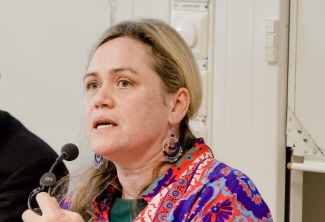Understanding how human behavior influences economic decision-making
Behavioral economist Prof Martine Visser is pioneering the use of ‘green nudging’ methods to encourage people in a developing world context to adopt pro-environmental behavior in the interest of the
Rebuilding Colombian fisheries: A success story
Assessing progress on sustainability in fisheries presents an urgent need to evaluate how management reforms interact with fishing communities to not only assure the health of the fish stock, but also create social and economic benefits. A number of fisheries management reforms are undertaken every year in recognition of the important role fisheries play in providing employment and income to remote coastal communities, contributing to food security and poverty alleviation.
Collapse and recovery of the Colombian queen conch resource
The triple-bottom-line (TBL) approach defines successful fisheries as those which are ecologically sustainable, capable of generating profits to fishermen, and socially accepted. This approach has brought two significant challenges to fishery managers. On the one hand, the TBL approach usually requires new types of data and analysis to guide scientifically-based fisheries assessment. Recent research suggests that scientifically-assessed fisheries have a better likelihood of success compared with scientifically-unassessed fisheries, which represent most developing country fisheries.
Volatility linkages between energy and wine prices in South Africa
Energy prices (for fuel and electricity) and energy price volatility impact wine prices. In the long run, we find a clear link between fuel and wine prices, implying that the two markets positively influence each other to the extent that a change in fuel prices influences wine prices. In the short run, we find that past volatility from wine prices as well as shocks from other markets, i.e., fuel and electricity, influence the current wine prices.
Local control and collective action in forest management: The case of China
To encourage sustainable use of forests, in 2003 China allowed rural villages to choose among a range of options to manage forests, including individual user rights with joint management. We studied how this individual user rights-based joint management affected forests and households.
Both property rights and voluntary decisions encourage cooperation. This resulted in better forest conservation in these villages in China, with about 10% more forest cover. This is also important because forests store carbon.
Short-run subsidies, take-up, and long-run demand for off-grid solar for the poor – evidence from large-scale randomized trials in Rwanda
Abstract
Over a billion people lack access to electricity, instead relying on kerosene and other dirty lighting sources, while grid expansion is not expected to keep pace with population growth. Moreover, pneumonia is the leading cause of death for under-fives in the world and kerosene smoke is a significant risk factor.
Pagination
- Previous page
- Page 26
- Next page
